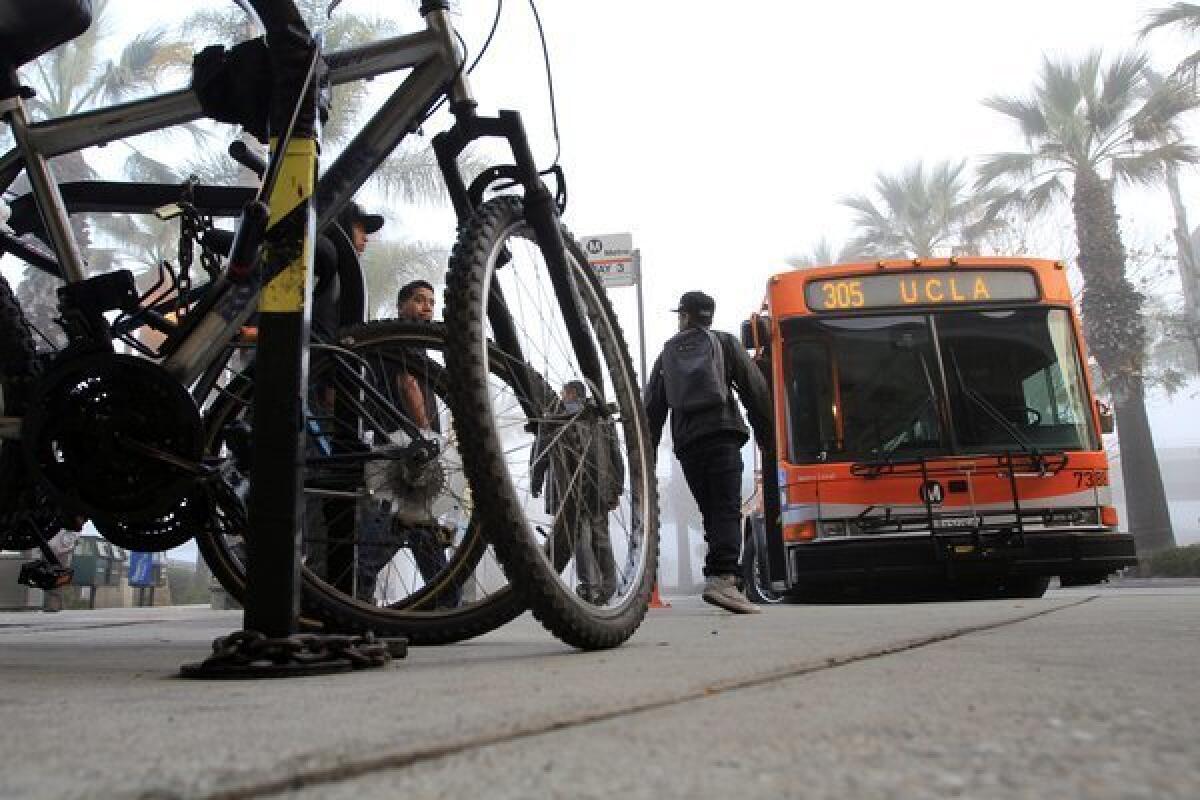Measure J still worthwhile, despite possible fare hikes

Measure J, the Nov. 6 ballot proposal that would extend a half-cent sales tax hike in Los Angeles County for another 30 years to accelerate transportation projects, was endorsed by The Times because it promises to ease traffic flow and stimulate the local economy without raising other taxes. But activists led by the Bus Riders Union say it will have an unintended effect: raising transit fares.
The opponents aren’t necessarily wrong -- future revenue and fare demands for the transit system are tough to predict, but past rail construction booms in L.A. have indeed resulted in reduced service for bus riders and higher fares overall. The questions, then, are will future fare hikes be reasonable, and are the improvements worth it? Based on what other cities charge for fares and what they offer in the way of public transit, I think the answer to both questions is yes.
The Bus Riders Union, whose 1994 lawsuit against the Metropolitan Transportation Authority for allegedly neglecting its bus network in order to focus on developing commuter rail led to a decade-long consent decree in which a special master oversaw bus service improvements, was quiet on Measure J until a couple of weeks ago, when it launched a protest campaign. Its major contention is that if Measure J passes and the MTA proceeds to accelerate construction of rail projects as planned, the MTA won’t have enough money to operate them, leaving the agency no choice but to raise fares and reduce bus service. That’s what happened in the mid-1990s when the Bus Riders Union sued the MTA, and it may have been a contributing factor to reductions in bus service last year, when about 4% of bus hours were cut.
ENDORSEMENTS: The Times’ recommendations for Nov. 6
That doesn’t mean Measure J will automatically result in fare hikes. That will depend on how many people ride the new rail lines and other factors. MTA chief Art Leahy told The Times that he has no plans to raise fares next year, but he wouldn’t make any guarantees after that. Even if ticket prices are hiked in the next couple of years, though, L.A. transit riders will probably still be getting a phenomenally good deal compared with other cities (which will, like L.A., also be under pressure to raise fares).
It’s tough to compare MTA fares with those in other cities because different transit agencies handle costs differently. Some cities, such as New York and Phoenix, charge more -- usually twice as much, in fact -- for a ticket on an express bus (with fewer stops) than a local bus. L.A. doesn’t charge more for express buses, though it does charge more for buses that travel on freeways. Meanwhile, cities such as Houston and Philadelphia charge more for tickets the farther one travels from the central city; in Houston, for example, a single bus ride within Zone 1 costs $1.25, but the fare rises to $4.50 if you’re going all the way to Zone 4.
Both these ideas -- extra fees for express, light-rail or subway service, or extra charges for longer rides -- represent fare structures that the MTA might adopt. Indeed, the Bus Riders Union would doubtless be thrilled if the MTA raised fares solely on rail service, which the organization sees as a system for well-off white commuters rather than low-income people of color. (The demographics of bus versus rail aren’t quite as clear-cut as bus advocates tend to think. MTA ridership surveys show that about 92% of bus riders are minorities, compared with 80% of rail riders.)
In any case, what’s striking about the comparison between Los Angeles and other cities is how comparatively cheap local transit is. A single-ride ticket on an MTA bus or train costs $1.50. I compared that to fares in the other nine biggest cities in the United States and found that all but one charge more, once you factor in the added costs of express buses, zone travel or the different fares charged in such cities as San Jose for buses versus light rail. In New York, for example, a single ride costs $2.25, and an express bus costs $5.50; the same applies in San Diego, except that express buses are a “mere” $5 for a single ride. Single bus rides in San Jose and Houston are technically cheaper than L.A. at $1.25, but that rises to $4.50 in Houston if you’re traveling to a distant zone; in San Jose, light-rail tickets cost $2 and express buses cost $4.
So which top-10 city is cheaper than Los Angeles? San Antonio, Texas, where a single bus ride costs only $1.10 (an express bus costs $2.50, but that’s still pretty cheap). Actually, San Antonio is the kind of city that L.A. bus activists would adore because it doesn’t have a rail network: Buses represent the only option for transit riders. But is that the kind of transit system Angelenos want?
Judging from the overwhelming public support for building rail networks -- Measure R, the sales tax hike that would be extended by Measure J, won two-thirds of the vote in 2008 even as the economy was starting to melt down -- the answer is clearly no. That’s because L.A.’s size and traffic problems dwarf those of San Antonio, gasoline prices are quite a bit higher here than in Texas, and commuters are crying out for an alternative that’s cheaper and faster than driving, which doesn’t apply to buses.
Moreover, independent examinations of L.A.’s transit system indicate that its well-rounded bus/rail network is more effective than systems in such cities as San Antonio. A U.S. News ranking of the 10 best U.S. cities for public transportation last year ranked Los Angeles third; San Antonio isn’t on the list. Last spring, the website Walk Score, which assesses the walkability of neighborhoods across the country, ranked cities by access to public transit and placed Los Angeles at No. 11, with San Antonio at No. 19.
The MTA needs to be sensitive about future rate hikes, and it could end up in hot water once again if it neglects the bus network to focus too heavily on rail. But memories of the consent decree make it almost certain that proposed increases will be reasonable and that buses will continue to get the attention they deserve, whether Measure J passes or not. Meanwhile, a congested city badly needs the relief that Measure J would bring. It’s a good deal for commuters that’s very unlikely to hurt bus-dependent people, and is still worth a yes vote Tuesday.
ALSO:
Sandy: Act of God or act of man?
Why yes on Prop. 39 but no on Prop. 35
Endorsements: The Times’ recommendations for Nov. 6
Subscribe to Dan Turner on Facebook
More to Read
A cure for the common opinion
Get thought-provoking perspectives with our weekly newsletter.
You may occasionally receive promotional content from the Los Angeles Times.






